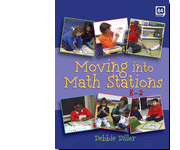Students adopt a cargo ship to learn real-life math Some students at a middle school in Massachusetts are learning math through the Adopt-A-Ship program. Lessons include calculating fuel for a Florida-based cargo ship. Students also correspond with the ship's staff and track its location. "It's cool just getting the information and then figuring out the problems from it, instead of (Mr. Wilson) just giving us an equation to do," pre-algebra student Donna Ross said. "It's a real and practical life situation." The Daily News (Newburyport, Mass.) (2/17)  | Try Lexia Reading Core5 FREE!
Designed specifically to meet the Common Core State Standards, Lexia Reading Core5™ provides personalized learning on foundational reading skills for students of all abilities in grades pre—K-5 and delivers norm-referenced performance data without interrupting the flow of instruction to administer a test. Try it for FREE now. |
 | Elementary school mixes physical activity with academics Instead of learning math, reading and other subjects at their desks, students at an elementary school in Tennessee go to the gym on Fridays to learn while playing games. A team of teachers at the school plan lessons each week that correspond with what students are learning in class. During a recent "Fab Friday," students practiced creating compound words and solving math problems during a series of relay races. Cleveland Daily Banner (Tenn.) (2/17) Other News  |
In her DVD Moving into Math Stations, K-2, Debbie Diller builds on her best-selling book Math Work Stations, bringing your staff into two real classrooms to see how to use manipulatives, manage time & space, incorporate whole-group instruction, encourage meaningful math talk, and more. View a 7-minute segment online! |
 | Career-education programs help meet workforce demands More schools in Ohio and northern Kentucky are developing career-education programs that seek to meet workforce demands for highly trained graduates, according to this article. School-based programs range from mechatronics to zoology to aviation. "The old high school vocational education used to be only entry-level job training," said Chris Zirkle, associate professor of workforce development and education at Ohio State University. "The academic aspect of career tech has really been ratcheted up because the jobs require a lot more training." The Cincinnati Enquirer (tiered subscription model) (2/15) Other News | Virtual schools are piloted in rural Iowa Two virtual schools are operating under a pilot program in Iowa, run by out-of-state education corporations and serving a primarily rural population. The schools are campaigning for more students following the release of mixed first-year test results, while lawmakers weigh more availability for virtual schools in the state. Still, some officials say, virtual schooling may not be the best educational model for all students. Sioux City Journal (Iowa) (2/16) | Teaching math for social justice "Teaching Mathematics for Social Justice: Conversations with Educators," released by NCTM in 2012, was recently named one of the top 75 New York Times best-selling education books of 2013! This collection of original articles launches a compelling conversation among some of the leading figures in social justice mathematics. Scholars share their perspectives with teachers and educators who have been inspired by them and who have inspiring stories of their own to tell about the intersection of education and social justice.
2014 Board of Directors election Do you know someone who would bring valuable experience, perspective, and judgment to the NCTM Board of Directors? Consider nominating them for the 2014 Board of Directors Election. Each year, NCTM's Board makes important decisions that set the direction for the Council and mathematics education. Learn more about the qualifications and responsibilities of NCTM directors and school incentives for Board service. Submit a nomination form by March 1.
|  | You cannot write for children. They're much too complicated. You can only write books that are of interest to them." -- Maurice Sendak, American writer and illustrator | | | | NCTM SmartBrief aggregates published news and editorial content from diverse sources. The content of NCTM SmartBrief does not necessarily reflect the positions of NCTM or the views of its leadership, and the viewpoints expressed or implied should not be interpreted as official NCTM positions. | Please contact one of our specialists for advertising opportunities, editorial inquiries, job placements, or any other questions.
| Mailing Address:
SmartBrief, Inc.®, 555 11th ST NW, Suite 600, Washington, DC 20004 | | |


No comments:
Post a Comment